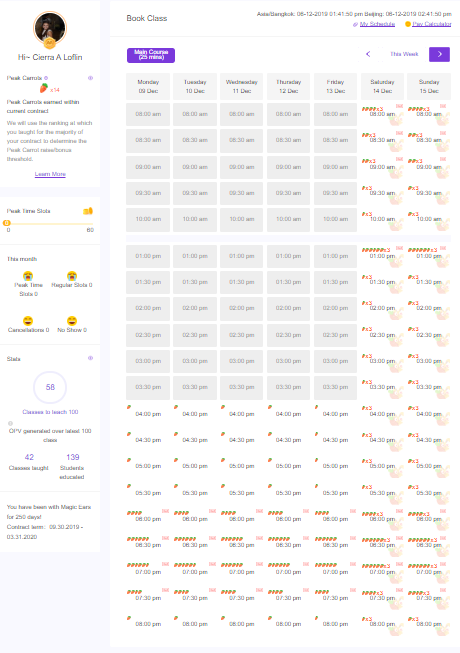5 things to know before teaching English online – MAGIC EARS GUIDE

Many of you have probably heard about teaching English online with Chinese companies like VIP Kid, DadaABC, and Magic Ears. It’s an ideal gig if you aspire to support yourself on remote jobs, make your own schedule and travel freely.
Though it may be more of a side income, it’s a great backup source of cash flow. Read on to find out everything you need to know about the job.
Requirements:
- Native English Speaker from the U.S or Canada
- Bachelor’s degree
- TEFL Certificate
If you’re interested in this side-gig and want the full picture of what it’s like to teach online, keep on reading!
What’s the bottom line?
- How flexible are scheduling and cancellations?
- How do bookings work?
- How do the students behave?
- What is the pay?
- What are the hours?

1) How flexible are the class schedules & cancellation policy?
The main advantage of Magic Ears over other online ESL companies is their FLEXIBILITY! You can open your schedule up to 4 weeks in advance and decide however many or little hours you want to be available for.
How it works:
Simply open a 30-minute time slot, and they will assign you a class 24 hours in advance. There are no “guaranteed hours,” however, which makes it hard to earn a lot in the beginning. There are no minimum hours you have to teach during the 6-month contract so if you have an unpredictable schedule, there are no worries there.
They say the earlier in advance you open time slots, the higher your bookings. Other companies like Landi and Whales English do require a weekly minimum of 6 to 8 hours.
Another great perk is their cancellation policy. You’re allowed 2 sick days and 2 emergency cancellations a month, no questions asked. With other companies like VIP kid, they charge you $10 for every missed class.
Magic Ears also charges $10 per missed class, but only if you no-show or cancel for a non-sick reason.

2) How do the class bookings work?
Magic Ears has a ranking system that determines how many bookings you get and how much money you make. The ranking goes: Freshman, Benchmark, Junior, and Senior.
They will give you feedback such as tying your hair back and avoiding voice dragging (ie. “gooood job”), as well as to encourage students more. Also, the less you teach, the less you make, and with each ranking comes to a higher percentage of bookings.
So as I said earlier, you click on a slot to open your availability, but that doesn’t necessarily mean you’ll have a class during that time. This system might seem strange, but with other companies like VIPkid, you have to market yourself and be booked personally, leading to more competition with older or more popular teachers.

3) How do the students act?
My first couple classes, I had angelic-like students who were very smart, eager to learn, and had their eyes glued to their webcam and myself. I legitimately loved teaching these students and thought, wow, easy money ($22/hr).
In these classes, there was also only 1 student, which makes things much easier, whereas a normal class can have up to 4 students with Magic Ears. As classes went on during the past 2 weeks, I have seen fewer and fewer of these rare, angelic students.
I’ve had students who stand up the whole time and dance, or eat with their faces really close to the camera, or are on their phones almost the entire time. I’ve also had a student who was screaming and eating and making “funny” faces in the camera.
It get’s worse:
There are also parents in the background giving their kids the answers while hidden from my view. (Like, I can hear you giving Johnny the answers). With Magic Ears, bookings are done by the company so I have no regular students.
That being said, I feel like it’s half and half. Half the time, I have students that are amazing and we have a really fun time; the rest of the time, well…you get the picture.
4) How much are you paid?
The pay scale works like this: $9 per class + $1-$2 bonus for finishing the 30- minute class and opening 60 “peak time” slots a month. Coming out to $22 an hour, it seems pretty reasonable.
But here’s the thing:
It seems reasonable until you factor in that you’re only teaching 1-1.5 hours a day Monday-Friday. Even opening my bookings for 2 hours a day, I only get booked for about half of that each day.
But it actually comes out to about half of that ($110), so it hardly feels worth my effort to wake up at 5:30 AM Monday-Friday just to make that amount. Which brings me to the hours.
5) What are the teaching hours?
Are you a morning person? Well, for this job, you kind of have to be depending on where you are in the world. That’s because Beijing Peak Time is 6 pm- 9 pm on the weekdays, which translates to 5 am- 8 am Central time with the 13-hour time difference.
Put more simply, the hours are evenings and weekends if you’re in SE Asia; mornings and weekends in the U.S.
My Verdict
To sum it up…
…by now, you know about the flexible schedule, the booking and ranking system, payment, hours, and students’ behavior.
The one downside is the low pay from having so few classes at first, but this increases with time.
If you’re interested in Magic Ears, my referral code is here which you can use to apply.
You may have to be a morning person while you live somewhere with a 13-hour time difference, but if you’re in SE Asia, it’s perfect! Depending on where you travel it could be a convenient way to make some extra cash.
Happy Teaching! Stay tuned for more online teaching resources.
Thank you so much if you have read this post. I appreciate you so much for taking the time and hope you liked it. Leave a question or contact me if you need help applying. Until next time, take care!

